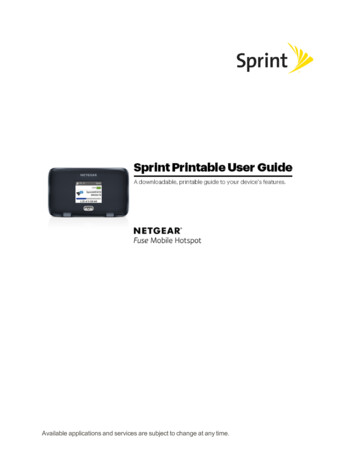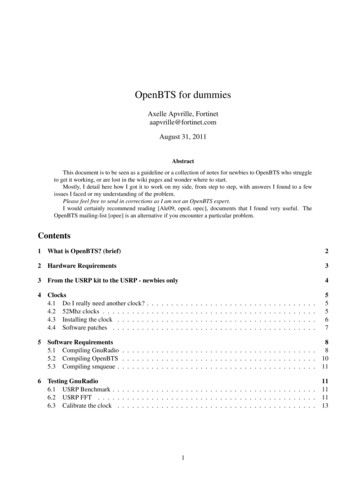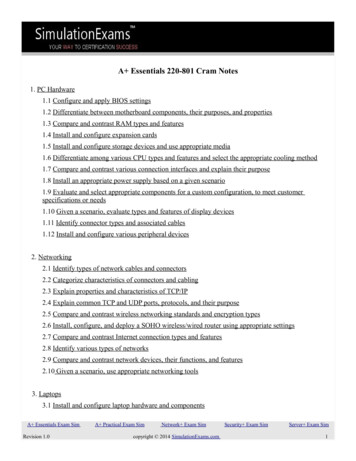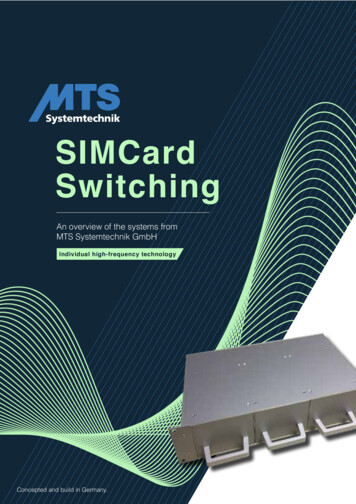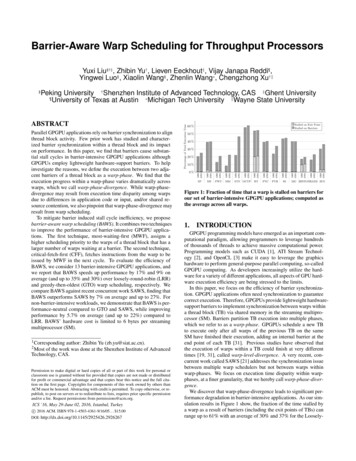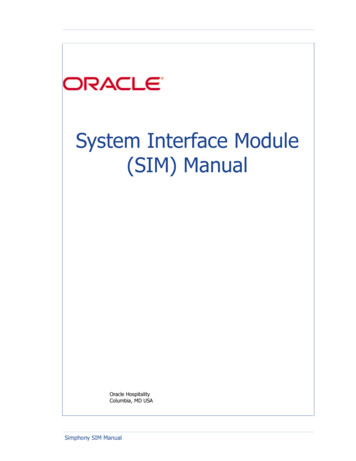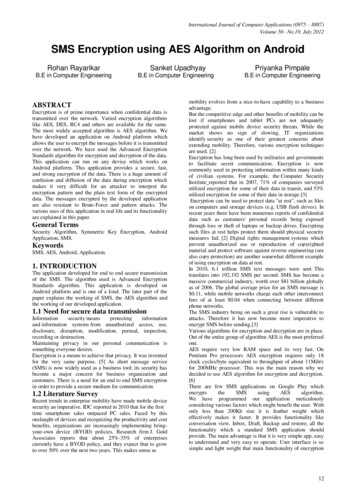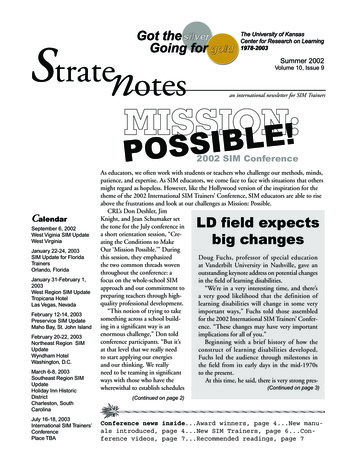
Transcription
StratenotesSummer 2002Volume 10, Issue 9an international newsletter for SIM Trainers!ELBIPOSS2002 SIM ConferenceCalendarSeptember 6, 2002West Viginia SIM UpdateWest VirginiaJanuary 22-24, 2003SIM Update for FloridaTrainersOrlando, FloridaJanuary 31-February 1,2003West Region SIM UpdateTropicana HotelLas Vegas, NevadaFebruary 12-14, 2003Preservice SIM UpdateMaho Bay, St. John IslandFebruary 20-22, 2003Northeast Region SIMUpdateWyndham HotelWashington, D.C.March 6-8, 2003Southeast Region SIMUpdateHoliday Inn HistoricDistrictCharleston, SouthCarolinaJuly 16-18, 2003International SIM Trainers’ConferencePlace TBAAs educators, we often work with students or teachers who challenge our methods, minds,patience, and expertise. As SIM educators, we come face to face with situations that othersmight regard as hopeless. However, like the Hollywood version of the inspiration for thetheme of the 2002 International SIM Trainers’ Conference, SIM educators are able to riseabove the frustrations and look at our challenges as Mission: Possible.CRL’s Don Deshler, JimKnight, and Jean Schumaker setthe tone for the July conference ina short orientation session, “Creating the Conditions to MakeOur ‘Mission Possible.’” Duringthis session, they emphasizedDoug Fuchs, professor of special educationthe two common threads wovenat Vanderbilt University in Nashville, gave anthroughout the conference: aoutstanding keynote address on potential changesfocus on the whole-school SIMin the field of learning disabilities.approach and our commitment to“We’re in a very interesting time, and there’spreparing teachers through higha very good likelihood that the definition ofquality professional development.learning disabilities will change in some very“This notion of trying to takeimportant ways,” Fuchs told those assembledsomething across a school buildfor the 2002 International SIM Trainers’ Confering in a significant way is anence. “These changes may have very importantenormous challenge,” Don toldimplications for all of you.”conference participants. “But it’sBeginning with a brief history of how theat that level that we really needconstruct of learning disabilities developed,to start applying our energiesFuchs led the audience through milestones inand our thinking. We reallythe field from its early days in the mid-1970sneed to be teaming in significantto the present.ways with those who have theAt this time, he said, there is very strong pres(Continued on page 3)wherewithal to establish schedulesLD eld expectsbig changes(Continued on page 2)Conference news inside.Award winners, page 4.New manuals introduced, page 4.New SIM Trainers, page 6.Conference videos, page 7.Recommended readings, page 7
StratenotesSummer 2002Pins presentedPins are presented to SIMTrainers at certain milestonesbased on the number of yearsthey have attended the international conference. This year, thefollowing presentations weremade:15-year pins: Gail Cheever,Trophy Club, Texas; Shari Schindele, Maple Grove, Minnesota;Don Deshler, Jean Schumaker,Keith Lenz, and Jan Bulgren,CRL; and Sue Vernon, EdgeEnterprises.10-year pins: Ann Valus, Bettendorf, Iowa; and Mary Whitaker, Overland Park, Kansas.5-year pins: Helen Barrier,Roanoke, Virginia; Kim Cotton,Wichita, Kansas; Rosalind Davenpor t, Oakland, California;Terry Freese, Rocky Comfort,Missouri; Karen Koskovich,Maquoketa, Iowa; Marsha LaFollette, Cedar Falls, Iowa; SandraLudwig, Tuttle, Oklahoma; MaryEllen O’Hare, Florissant, Missouri; Gail Slattery, Elk Point,South Dakota; Toni Van Cleve,Altoona, Iowa; and Karen Willits,Oskaloosa, Kansas.STRATENOTES is published eighttimes from September through Mayand once every summer as partof Strateworks of the InternationalTraining Network by the Center forResearch on Learning, 2001-2002,cost 35.00. Permission to reproduceany or all parts of Stratenotes tosupport training activities is herebygiven.Contributors: Donald D. DeshlerJean B. SchumakerB. Keith LenzJim KnightJanet B. RothEditor:Julie Tollefson2The University of KansasCenter for Research on Learning(Continued from page 1)within buildings so it’s much more thansimply matching a child with an intervention.”Throughout the conference, severalpresenters shared information abouttheir experiences trying to implementstrategy instruction throughout aschool. Here’s a sample of topicsthey addressed: Rosalind Davenport, principal atWoodstock Elementary Schoolin Alameda, California, presented “Building a SchoolwideStrategic Environment: It Ain’tEasy.” The session focused on thejourney of a high poverty, “underperforming” elementary school towarda strategic environment. CRL’s DonDeshler and Jean Schumaker continued with “Creating Strategic Schools:Case Studies of Two Small Schools,”in which they described work duringthe past five years to transform twosmall private schools into strategicschools. Sue Woodruff, an independenttrainer from Muskegon, Michigan,presented “REVISE: A Routine forFacilitating Schoolwide Change,” atool for leading workshops aimedat engaging fellow teachers in dialogue and examining current realitieswithin specific settings. CRL’s Jim Knight and Keith Lenzalong with Cathy Spriggs, an instruction facilitator at Turlock (California)Junior High School, and Sue Woodruff tackled the subject of schoolwideliteracy by describing the solutioneach attempted, the administrativestructure that was created, and theresults of their efforts. Jim alsodescribed the Pathways to Successproject, now in its third year, whichexplores ways in which SIM can beimplemented districtwide. CRL’s Barbara Ehren and AnitaFriede, an independent trainer fromNew York City, reviewed the principles of the Concerns Based Adoption Model as a tool for promotingchange at the school level.!ELBISSPO2002 SIM ConferenceThe conference also introduced anew tool to support our commitmentto high-quality professional development, the Partnership Learning Fieldbook by Jim Knight. The fieldbookdescribes a partnership approach toconducting workshops. It includeschapters on principles, learning structures, sample workshop plans, and theresearch behind Partnership Learning.Several of the conference sessions demonstrated aspects of Partnership Learning.In addition, many of the sessionsfocused on issues associated with adolescent literacy, a topic garnering a greatdeal of interest at the national level.Earlier this year, CRL was invited topresent an overview of SIM during aseries of adolescent literacy workshopssponsored by several government agencies and professional associations.(More information about the workshopseries is available online at www.nifl.gov/partnershipforreading/adolescent.)A list of conference sessions is available on the CRL web site: www.kucrl.org/2002con/sessions.html. Videotapes of selected sessions may be purchased using the order form on page 7.Heard at the conference.If we just have great service in one year, but not the next—if we don’thave good communication from one feeder school into the next, fromone teacher to the next—so many of the effects that we’ve realizedget washed off.—Don Deshler, CRL
StratenotesSummer 2002LD eld expecting big changes(Continued from page 1)sure to change the definition oflearning disabilities in fundamentalways.Historically, he said, childrenwere identified as having a learningdisability if parents and teachersperceived them to be generallycompetent and yet they had specific,severe problems in someacademic area, such asreading or math.In the middle to late1970s, states asked thefederal government forhelp determining how toidentify kids with learningdisabilities.“The best the federalgovernment could come upwith at that time was tosuggest to the states thatthey use the notion ofsevere discrepancy,” Fuchssaid.The government did notspecify what it meant bysevere discrepancy, leavingit to individual states to decideon their own. Eventually, Fuchssaid, severe discrepancy becamesynonymous with a discrepancybetween IQ and achievement.Today, the IQ achievementdiscrepancy model is the mainmethod used for identifyingstudents with LD. It has come underscrutiny and alternative methods arebeing considered, in part because ofthe dramatic rise in the nimber ofstudents identified as LD and theconcurrent rise in the cost of specialeducation.In 1976, the number of childrenidentified as LD was about 750,000.Today, that number stands at 2.5-3million.One alternative to the IQachievement discrepancy model thatis gaining support is to just uselow achievement as a marker forLD, Fuchs said. Closely related tothis concept is that LD shouldbe redefined in terms of a child’snonresponsiveness to generallyeffective instruction.Doug FuchsBecause the nonresponsivenessmodel is gaining so much attentionat the national level, Fuchs spentsome time describing its basiccharacteristics.First, he said, the model requiresthat generally effective instructionbe in place in the general educationclassroom. Students are tested todetermine whether they are makingprogress in this environment, andthose who do not respondappropriately are “nonresponders.”The nonresponders are thengiven more intensive treatment,which could vary depending onthe version of this approach thatis ultimately adopted. Some peoplesuggest that nonresponders betaught by classroom teachers insmall groups. Others suggest thatanother professional—a readingspecialist, a special educationteacher, or a school psychologist, forexample—take the students out ofthe classroom and work with themin small groups.During this treatment level, dataare collected regularly.Again, some students mayrespond and some studentsmay not respond.“The kids who respondpresumably go back intoregular classrooms,” Fuchssaid. “The kids who don’trespond might be passedon to an even moreintensive form ofremediation. So you havethese tiers and everything isfluid and loose.”Fuchs noted that manydifferent versions of theresponsiveness to treatmentmodel are beingconsidered. Some have justone tier; others, such as themodel used by Heartland EducationAgency in Iowa, have a four-tierapproach. In that model, a studentprogresses through at least three tiersbefore being determined as eligiblefor special education.“In all of this, there is nosuggestion that IQ achievementdiscrepancy play a role. It is justresponsiveness to treatment,” heemphasized.When asked how quickly heexpects a new definition of learningdisability and a new identificationmethod to be adopted, Fuchsreferred to the comingreauthorization of IDEA, which isexpected very soon.The University of KansasCenter for Research on Learning3
StratenotesSummer 2002New manualsThree new manuals madetheir debut during the 2002 International SIM Trainers’ Conference:The Question ExplorationRoutine is a package of instructional methods that teachers canuse to help a diverse studentpopulation understand a body ofcontent information by carefullyanswering a “critical question”to arrive at a main idea answer.As part of the routine, a visualdevice, the Question ExplorationGuide, is developed with students. In this process, studentsare guided in identifying keyterms in a critical question and“unpacking” the large questionin smaller questions. Studentsalso are challenged to apply themain idea to complex contentinformation and real-world use.Organizing Together andTaking Notes Together arethe two latest additions to theCommunity Building Series. Thegeneral goal associated with theseries is to create safe and supportive learning environmentsfor students with disabilities ininclusive classes. This is donethrough teaching students aboutconcepts such as respect andtolerance and providing eachstudent a partner who can provide support during the learningprocess.The Organizing Together program can be used to provideinstruction in some basic strategies associated with keepingnotebooks, schedules/calendars,desks, lockers/cubbies, andbackpacks organized. The TakingNotes Together program canbe used to teach students asimple strategy for taking notesin response to a variety of stimuli,including lectures, demonstrations, movies/videotapes, andreading assignments.4The University of KansasCenter for Research on LearningCRL, SIM network honoroutstanding partners, leadersEvery year, individuals who have madeoutstanding contributions to the workof the SIM network are honored fortheir commitment and partnership. Sixsuch people were honored during thisyear’s recognition luncheon.teachers and, as a result, studentsbecome strategic learners and who havebeen leaders in the SIM Network.Helen Barrier, high incidencecoordinator, Roanoke, Virginia, hasbeen a SIM Trainer since 1995. She hasnever missed an update and has offeredprofessional development sessions for a“massive” number of teachers. In fact,she is one of the national leaders in thenumber of registration of training formsshe has sent to CRL. Helen shares herexcellent training materials and ideasGordon R. AlleyPartnership AwardThis award acknowledges theoutstanding contributions of individualsfor their work in enabling theUniversity of Kansas Center forResearch on Learning to fulfill itsmission.Tom Skrtic was one of theinitial CRL researchers in itsformative years. Since that time,he has been a strong advocatefor the CRL research agendathroughout the university.During the past five years,while serving as chair of KU’sDepartment of SpecialEducation, Tom has ensured thatSIM Leadership Award winners Bevthe needs and interests of CRLMommsen, Helen Barrier, and Cathy Spriggshave been strongly supported.Without his strong leadership onwith other trainers freely in numerousbehalf of CRL, we would not haveways and has been an outstandingmade the progress that we have inmentor for others. She is a leaderrecent years.in providing Content EnhancementJohn Poggio, an internationallyworkshops for teachers and is a mentorrecognized expert on assessment andfor new SIM Trainers in Virginia. Inevaluation and professor of educationaddition, she has presented at regionalat KU, has consulted with severaland international SIM conferences.researchers, teachers, and graduateBev Mommsen, educationalstudents affiliated with CRL. John neverconsultant, Mississippi Bend Areasays “no” to a request for assistance orEducation Agency, Clinton, Iowa, hasinput. Not only is he always exceedinglybeen a SIM Trainer since 1986. Shewilling to help, but he also offershas been an enthusiastic supporterbrilliant insights for ways to improveof strategies instruction as a teacher,our research and intervention efforts.trainer, and educational consultantand has been a strong advocate forSIM Leadership Awardstrategic instruction in the districts andThis award recognizes individuals whobuildings she serves as a consultant.have shown exceptional leadership byBev has assisted with coordinating areahelping educators become strategic
StratenotesSummer 2002Workshop for college,university facultyJohn Poggio, Jean Schumaker, Tom Skrtic, and Don DeshlerSIM conferences and has presentedat both area and international SIMconferences. She estimates that morethan 1,000 individuals have attendedher workshops. In addition, Bevparticipated in the StratelliteConnection video series.Cathy Spriggs, instruction facilitator,Turlock (California) Junior HighSchool, has been a SIM Trainersince 1990. Cathy, a SIM leader inCalifornia, was nominated for thisaward by three different trainers inthe states of Michigan, Colorado, andTexas because of all she has sharedwith other trainers across the network.She designed and developed the WordID Routine; designed and developed aphonics program to parallel instructionin Word ID; and is conductinga research pilot using the WordID Routine and Fundamentals ofSummarizing. Cathy, who has offeredprofessional development workshops atcounty, district, and site levels, was oneof the coordinators for the CaliforniaSummer Institute for teachers thisyear. In addition, she promoted SIMas a presenter at the CaliforniaSecondary Summit and the MiddleSchool Demonstration Program statelevel conferences. She also has presentedseveral times at the international SIMconference.SIM AdministrativeLeadership AwardThis award honors a person who is amember of or affiliated with the SIMTrainers’ Network and who servesin an administrative position in aschool or school district. The awardrecognizes individuals for outstandingleadership andcontributions inpromoting SIMand otherresearch-basedpractices.LarryHartwig, aneducationalconsultant withLarry HartwigMississippiBend Area Education Agency inBettendorf, Iowa, is largely responsiblefor a recent resurgence of interest inSIM, according to SIM Trainer AnnValus, who nominated him for thisaward. Larry’s first exposure to SIM’sstrategies came in 1986. Since then,he has been a tireless and enthusiasticsupporter of strategies instruction.Through his advocacy, two schoolshe works with have implementedSIM components. Larry personally preand post-tested numerous students inthe schools and was instrumental inensuring that a group of teachers fromthe high school were included in afield trip to Muskegon (Michigan) HighSchool to see SIM in action.SIM Trainers Patty Granerand Gail Cheever are asking thenetwork to help recruit collegeand university faculty to participate in the Teaching Content toAll: Effective College Teachingworkshop. The workshop will beMay 27-31, 2003, in Lawrence,Kansas.Formerly known as the Pedagogies for Academic Diversity inSecondary Schools Workshopfor Preservice Educators, theworkshop has been redesignedand should appeal to newcollege and university faculty,faculty interested in improvingtheir teaching skills, facultyengaged in teacher preparation, and teams of faculty fromdepartments or institutions.The workshop will target improving teaching skills focusing on effective courseplanning dealing with academic diversity creating a successful learningcommunity promoting critical thinking preparing teachersThe application deadline forthe workshop is March 1, 2003.Application materials and moredetailed information is availableon the CRL web site, www.kucrl.org.Interested individuals alsomay call CRL at (785) 864-4780or e-mail Patty and Gail atcheever graner@yahoo.com.The University of KansasCenter for Research on Learning5
StratenotesSummer 2002New SIM Potential trainerTrainers workshop participantsThe following new SIMTrainers received theircertificates during the 2002International SIM esIowa: Amy SturmKansas: Wendy MeierLouisiana: Anne Clouatre andPat NealMichigan: Deborah UnderhillMinnesota: FrancesBeversdorf, Molly Lynch, andBeth MortinsonNorth Carolina: Alice BartleyOntario, Canada: NancyLeishmanTexas: Liz Gaidry and LeeSchwartzContentEnhancementCertificatesVirginia: Robert Kenistonand Donna SchwabA complete list of newlycertified SIM Trainers,including those who wereunable to attend theconference, will appear inthe September issue ofStratenotes.The following people have completedpotential trainer workshops for eitherLearning Strategies or ContentEnhancement.Content EnhancementCaliforniaTrainer: Nancy SanderEllen Cook, Aaron Keller, RoxaneKushner Moore, Pamela Nehring,Judith Porter, Linda Stathis, and SheriWilkins.FloridaTrainers: Connie Gentle and JerriNeduchalSharon Bittle, Deane Brewin, SusanBurns, Mary Lou Duffy, DeborahHughes, Cassandra Keller, LindaOaksford, and Kimberly Richards,Florida; and Lynda Richards and CarolSeay, Georgia.LouisianaTrainer: Rosemary TralliSue Babers, Amy Betts, Jeanne Bower,Kristina Braud, Mindy Byard, DoryDoud, Pam Fite, Terry Heintz-Caldwell,Barbara Henry, Jan Jarrell, KennethJenkins, Monica Jenkins-Moore,Sharoine Jones-Davis, Carolyn Kane,Tina Kendrick, Judith M. Konikoff,Rachel Lato, Phyllis Lehr, MelissaMatthews, Clara McNeely, Judy Milam,Martha Moore, Patricia Morris,Suzanne Nerren, Sheryl Nix, DemariousPoole, Vicky Pritchett, Barbara “Chris”Reeves, Malekah Salim-Morgan, andTerry Tyler, Louisiana; Linda Gatlin,Mississippi; and Anna LoBianco, NewYork.TexasTrainer: Conn ThomasEdi Brannon, Jay Dea Brownfield,Elizabeth Gaidry, Mary Lou Parker,Victoria Ricketts, Pamela Stephens,6The University of KansasCenter for Research on LearningOdessa L. Wood, and Frieda LeeSchwartz, Texas; and Ruby LynchArroyo, New Mexico.WashingtonTrainers: Keith Lenz, Patricia Graner,and Barbara EhrenLeslie Herod, California; John J.Donermeyer, Illinois; Fran Price,Louisiana; and Joani Bishop, DinaFox, Nancy Hebert, Janelle Kreis, andChuck Richards, Washington.Learning StrategiesFloridaTrainers: Debbie Cooke and JanetAtallahMelissa Barton, Meryl Chayt, CathyFreytag, Sheila Harwell, Melissa Hayes,Alice Horton, Kelly Kayle-Gallon,Joyce Mooneyham, Barbara Pack,Cynthia Pelosi, Denise Stevenson, andMarie Warren, Florida; Nora Swenson,Georgia; and Marie Long Chavis, NorthCarolina.IowaTrainer: Ann HoffmanPamela Fields, Sue Powers, DonnaShaw, Kathy Simon, Kathleen Walech,and Maryjo L. Williams.MissouriTrainer: Rosemary TralliJay Gjerstad, Iowa; Amy Mahlke,Minnesota; and Alice Bowers, GaryBrent Grimes, Karen Rosso, and GailWulff, Missouri.WashingtonTrainers: Keith Lenz, Patricia Graner,and Barbara EhrenKathryn L. Demakopoulos, California;Marc Logue, Mona Meighan, andDebbie Staub, Washington; and DianeDiederichs and Katie Rortvedt,Wisconsin.
Conference videos for saleSeveral videos of conference sessions are available for purchase. Videos marked as“Combination” contain two sessions. For a complete description of each session, seethe listing on our web site, estion Exploration RoutineJanis Bulgren and Keith Lenz, CRL (The Question Exploration Routine is one of the newest manuals from CRL.) 15Keynote Address: Changing the Definition of “LearningDisabilities”: Implications for EducatorsDoug Fuchs, Professor of Special Education, VanderbiltUniversity, Nashville, Tennessee 15CRL’s Big Role in Promoting Adolescent Literacy.and Other Educational InnovationsKeith Lenz, Barbara Ehren, and Don Deshler, CRL 15[Combination] Building a Schoolwide StrategicEnvironmentRosalind Davenport, Principal, Woodstock ElementarySchool, Alameda, California 15 15 15and Fundamentals of Summarizing, Jim Knight, CRL[Combination] Effective Components of aSmarttogether Strategic Learning CenterKeith Lenz, Aaron Sumner, and Lisa Walsh, CRLand Implementation of Strategic Tutoring in AfterSchool Support ProgramsMike Hock, CRLTotal amount of order:Summer 2002CRL notes.Jeff Thomas, CRL’s videographer for the past several years,has left for Florida, where his wifehas accepted a teaching position. Jeff reports that the snorkeling and kayaking opportunitiesare better in Florida than inKansas.Keith Lenz, CRL researchscientist who has made Seattlehis home for many years, hasreturned to Lawrence and theUniversity of Kansas in a newrole: that of associate professorof special education. Keith takeson his new responsibilities forthe Fall 2002 semester.Recommended readingand Creating Strategic Schools: Case Studies of TwoSmall SchoolsDon Deshler and Jean Schumaker, CRL[Combination] Developing Academic Relationships:Leveraging Learning Expressways to ImproveLearning, Keith Lenz, CRLStratenotesSend this order form with your check or purchase order to CRL Order Desk,University of Kansas, Joseph R. Pearson Hall, 1122 West Campus Road, Room 517,66045-3101. To pay by credit card, call the order desk at (785) 864-0617.Several conference participants shared the names ofbooks, articles, and other publications relevant to the work ofthe SIM Network. Here are a fewof the recommendations heardduring the conference: Swanson,H.L.(1999).Instructional components thatpredict treatment outcomesfor students with learningdisabilities: Suppor t for acombined strategy and directinstruction model. LearningDisabilities Research andPractice, 14, 129-140. Implementing Change: Patterns, Principles and Potholes by Gene Hall and Shirley Hord (2001, Allyn andBacon). Surpassing Ourselves: AnInquiry into the Nature andImplications of Expertise byCarl Berieter and MarleneScardamalia (1993, LibraryPr (Open Court)) The Tipping Point: How LittleThings Can Make a Big Difference by Malcolm Gladwell(2000, Little Brown & Co.)Additional recommendations are listed on CRL’s website: www.ku-crl.org/2002con/reading.html.The University of KansasCenter for Research on Learning7
StratenotesSummer 2002Strateworks Renewal 2002-2003Time to renewThis is the last issueName:Home Address:City:State:of Stratenotes for theZIP:2001-2002 publicationHome Phone:period. If you haven’t alreadyWork Address:done so, please take aCity:State:ZIP:moment now to renew yourWork Phone:Strateworks membership.Please indicate at which address you prefer to receive mail:homeworkE-mail address:Mail completed form and your payment of 35 (U.S.)to KU-CRL, Attn: Order Desk, Joseph R. Pearson Hall, 1122 WestCampus Road Room 521, Lawrence, KS 66045-3101.FIRST CLASSUniversity of KansasSTRATENOTES Volume 10-Issue #9CENTER FOR RESEARCH ON LEARNINGInstitute for Effective InstructionJoseph R. Pearson Hall1122 West Campus Road, Room 521Lawrence, Kansas 66045-31018The University of KansasCenter for Research on Learning
Orlando, Florida January 31-February 1, 2003 West Region SIM Update Tropicana Hotel Las Vegas, Nevada February 12-14, 2003 Preservice SIM Update Maho Bay, St. John Island February 20-22, 2003 Northeast Region SIM Update Wyndham Hotel Washington, D.C. March 6-8, 2003 Southeast Region SIM Update Holiday Inn Historic District Charleston, South .
